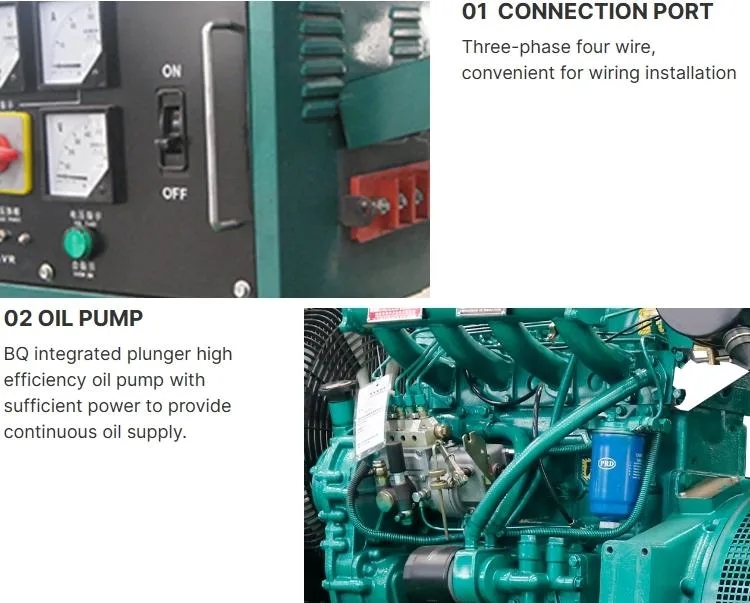Navigating Regulatory Requirements for Diesel Generators A Comprehensive Guide
Introduction
Diesel generators play a crucial role in providing backup power during emergencies or in remote locations where access to the grid is limited. However, the operation of diesel generators is subject to various regulatory requirements aimed at ensuring safety, environmental protection, and compliance with industry standards. In this article, we will explore the key regulatory requirements that govern the use of diesel generators, including emissions standards, installation regulations, and maintenance guidelines.
Emissions Standards for Diesel Generators
One of the primary regulatory concerns regarding diesel generators is the emissions they produce, which can have harmful effects on air quality and public health. To address this issue, governments around the world have implemented stringent emissions standards for diesel generators. These standards typically focus on limiting the amount of pollutants, such as nitrogen oxides (NOx), particulate matter (PM), and carbon monoxide (CO), that are released into the atmosphere.
In the United States, the Environmental Protection Agency (EPA) sets emissions standards for diesel generators under the Clean Air Act. The EPA's regulations require diesel generators to meet specific emission limits based on their size, power output, and application. For example, non-road diesel engines used in stationary generators must comply with Tier 4 emission standards, which significantly reduce the levels of NOx and PM emissions compared to earlier tiers.
In addition to federal regulations, many states and local jurisdictions have their own emissions standards for diesel generators. It is important for generator owners and operators to be aware of and comply with these regulations to avoid potential fines and penalties. Regular emissions testing and maintenance of diesel generators are essential to ensure compliance with emissions standards and minimize their environmental impact.
Installation Regulations for Diesel Generators
In addition to emissions standards, diesel generators are subject to various installation regulations to ensure their safe and proper operation. These regulations cover a wide range of aspects, including site selection, fuel storage, exhaust systems, and electrical connections. Compliance with installation regulations is essential to prevent accidents, fires, and other safety hazards associated with diesel generators.
When installing a diesel generator, it is important to consider factors such as proximity to buildings, ventilation requirements, and fuel supply arrangements. The generator should be placed in a well-ventilated area away from combustible materials to reduce the risk of fire. Fuel storage tanks should be located in accordance with local codes and regulations to prevent spills and leaks that could contaminate the environment.
Exhaust systems for diesel generators must be designed and installed to safely remove combustion gases from the engine and disperse them away from occupied areas. This often involves the use of exhaust pipes, silencers, and emissions control devices to reduce noise levels and emissions. Proper ventilation and maintenance of exhaust systems are critical to ensure the safe and efficient operation of diesel generators.
Electrical connections for diesel generators must comply with relevant electrical codes and standards to prevent electrical hazards and ensure reliable power distribution. This includes proper grounding, overcurrent protection, and voltage regulation to protect equipment and personnel from electrical faults. Regular inspections and testing of electrical connections are necessary to maintain compliance with installation regulations and prevent malfunctions.
Maintenance Guidelines for Diesel Generators
Regular maintenance is essential to keep diesel generators in optimal condition and extend their operational life. Regulatory requirements for maintenance often include routine inspections, testing, and servicing of critical components to prevent breakdowns and ensure reliable performance. By following maintenance guidelines, generator owners can minimize downtime, reduce repair costs, and comply with regulatory standards.
Key maintenance tasks for diesel generators include:
1. Fuel system inspection: Regularly check fuel tanks, filters, and lines for leaks, contamination, and blockages that could affect engine performance. Clean or replace fuel filters as needed to prevent fuel system problems.
2. Cooling system maintenance: Monitor coolant levels, hoses, and radiators to prevent overheating and engine damage. click this and refill the cooling system at recommended intervals to maintain proper temperature control.
3. Lubrication service: Change engine oil and filters according to manufacturer recommendations to prevent wear and friction in moving parts. Use high-quality lubricants that meet industry standards for diesel engines.
4. Electrical system testing: Conduct regular checks of batteries, wiring, and connections to ensure proper voltage levels and electrical continuity. Test backup batteries and automatic transfer switches to verify their functionality during power outages.
5. Emissions control inspection: Verify that emissions control devices, such as catalytic converters and diesel particulate filters, are functioning correctly and meeting regulatory requirements. Clean or replace these components as necessary to reduce harmful emissions.
6. Engine performance evaluation: Monitor engine parameters, such as speed, temperature, and pressure, to detect signs of wear or malfunction. Perform diagnostic tests and tune-ups to optimize engine performance and fuel efficiency.
By following these maintenance guidelines, generator owners can ensure the safe and reliable operation of diesel generators while complying with regulatory requirements. Regular maintenance not only extends the life of the generator but also reduces the risk of accidents, breakdowns, and emissions violations.

Conclusion
Diesel generators are essential backup power sources that require careful attention to regulatory requirements to ensure their safe and efficient operation. Emissions standards, installation regulations, and maintenance guidelines play a critical role in governing the use of diesel generators and protecting the environment, public health, and infrastructure. By staying informed about regulatory requirements and following best practices for emissions control, installation, and maintenance, generator owners can minimize risks and liabilities associated with diesel generators. Compliance with regulatory standards is not only a legal obligation but also a responsible approach to maintaining the reliability and sustainability of diesel generators in various applications.